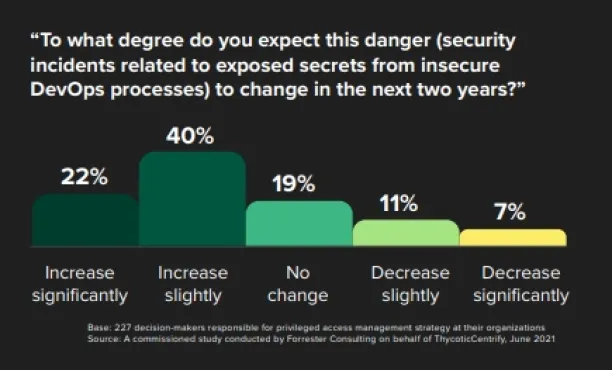5 Benefits of Intelligent Orchestration in Securing DevOps in '24
Building security into the DevOps pipeline is significant for secure and reliable software deliveries. According to Forrester, 57% of decision-makers experienced a security incident related to their DevOps processes over the last two years, and 62% of the participants informed that they expect an increase in the number of incidents targeting DevOps in the next two years (Figure 1). The high number of cybersecurity threats in the tech world forces software development lifecycles (SDL) to be more resilient against them.

One of the new approaches to address security challenges in the DevOps pipeline is intelligent orchestration. Intelligent orchestration helps security teams to link application security assessment into the DevOps pipeline. It automatically runs security tests to ensure there are no security gaps.
Adopting intelligent orchestration can streamline application delivery and enhance customer satisfaction. This article explores five benefits of intelligent orchestration in securing the DevOps pipeline.
1. Automated error detection and remediation
Intelligent orchestration offers automated reviews to spot errors and fix them quickly. It does not only help to find defects and errors but also offers remediation advice, based on the descriptions and steps set earlier.
When an issue arises, users can get instant notifications from issue-tracking systems. Thereby, security teams can learn about flaws and act earlier than manual and tedious security activities.
2. Automated security testing
Manual methods for security tests are often error-prone, time-consuming, and inefficient. Manual security testing;
- is disconnected from the development process,
- and creates friction in the continuous integration (CI)/continuous deployment (CD) process.
Intelligent orchestration automates security testing and integrates security analysis into the DevOps pipeline. This saves developers from spending a long time on security checks and prevents friction between teams.
Explore automation testing in more detail.
3. Customized rules for security checks
According to a report by Verizon, cloud misconfigurations rank second only to hacking as a reason for data breaches. Intelligent orchestration enables teams to set rules and policies that can be consulted during security checks. These policies can be compliance procedures as well as governance requirements.
A security check can be configured as a code, and this code guides the security testing to check what, when, and where. By 2024, it is estimated that implementing adequate security can cut misconfiguration by 80%.
4. Accelerated software development cycle
Companies often sacrifice cybersecurity for the sake of speed. A survey found that 40% of decision-makers informed that security access controls slow down developer productivity.
With intelligent orchestration, you don’t need to sacrifice anything. Intelligent orchestration runs only the required security checks at the right place and at the right time and removes unnecessary, time-consuming manual activities. By using intelligent orchestration, development pipelines can deliver better quality products in a more secure and faster way.
5. Saved Costs
Adopting intelligent orchestration into your DevOps pipeline helps you to save costs by detecting errors earlier than they affect you. Security staff can be freed up from manual and tedious security testing processes and can be reassigned for more productive tasks.
Further Reading
To learn more about automation and orchestration, feel free to read our articles:
- Automation vs Orchestration: Differences & How to Get Started
- Guide Into IT Orchestration: Benefits, Use Cases & Tools
- Top 14 Workload Automation Use Cases in IT, HR, & Accounting
If you are looking for automation and orchestration tools, you can visit our hub for the automation software landscape.
To gain a more comprehensive overview of workload automation, download our whitepaper on the topic:
If you have other questions about intelligent orchestration, we can help:

Cem has been the principal analyst at AIMultiple since 2017. AIMultiple informs hundreds of thousands of businesses (as per similarWeb) including 60% of Fortune 500 every month.
Cem's work has been cited by leading global publications including Business Insider, Forbes, Washington Post, global firms like Deloitte, HPE, NGOs like World Economic Forum and supranational organizations like European Commission. You can see more reputable companies and media that referenced AIMultiple.
Throughout his career, Cem served as a tech consultant, tech buyer and tech entrepreneur. He advised businesses on their enterprise software, automation, cloud, AI / ML and other technology related decisions at McKinsey & Company and Altman Solon for more than a decade. He also published a McKinsey report on digitalization.
He led technology strategy and procurement of a telco while reporting to the CEO. He has also led commercial growth of deep tech company Hypatos that reached a 7 digit annual recurring revenue and a 9 digit valuation from 0 within 2 years. Cem's work in Hypatos was covered by leading technology publications like TechCrunch and Business Insider.
Cem regularly speaks at international technology conferences. He graduated from Bogazici University as a computer engineer and holds an MBA from Columbia Business School.
To stay up-to-date on B2B tech & accelerate your enterprise:
Follow on![Customer Information System Utilities: 10+ solutions & 6 applications [2024]](https://research.aimultiple.com/wp-content/uploads/2024/02/CIS-google-trends-190x107.png.webp)

Comments
Your email address will not be published. All fields are required.